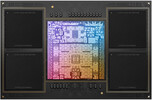Apple M2 Max vs Intel Core i9-10880H
Apple M2 Max
► remove from comparison
The Apple M2 Max is a System on a Chip (SoC) from Apple that is found in the early 2023 MacBook Pro 14 and 16-inch models. It offers all 12 CPU cores available in the chip divided in eight performance cores (P-cores) and four power-efficiency cores (E-cores). The E-cores clock with up to 3.4 GHz, the P-Cores up to 3.7 GHz (mostly 3.3 GHz in multi-threaded workloads and 3.4 GHz in single threaded).
The big cores (codename Avalanche) offer 192 KB instruction cache, 128 KB data cache, and 36 MB shared L2 cache (up from 24 MB in the M1 Pro). The four efficiency cores (codename Blizzard) are a lot smaller and offer only 128 KB instruction cache, 64 KB data cache, and 4 MB shared cache. CPU and GPU can both use the 49 MB SLC (System Level Cache).
The unified memory (32, 64, or 96 GB LPDDR5-6400) next to the chip is connected by a 512 Bit memory controller (400 GB/s bandwidth) and can be used by the GPU and CPU.
The CPU performance should be quite similar to the M2 Pro as only the higher memory bandwidth and bigger L3 cache could make a difference for some workloads.
The integrated graphics card in the M1 Max offers a 30-core GPU or a GPU with all 38 cores.
Furthermore, the SoC integrates a fast 16 core neural engine (faster than M1 Max), a secure enclave (e.g., for encryption), a unified memory architecture, Thunderbolt 4 controller, an ISP, and media de- and encoders (including ProRes).
The M2 Max is manufactured in 5 nm at TSMC (second generation) and integrates 40 billion transistors. The power consumption of the CPU part is up to 36 Watt according to powermetrics. When fully loading the CPU and GPU cores, the chip uses up to 89 Watt and the CPU part is limited to 25 Watt.
Intel Core i9-10880H
► remove from comparison
The Intel Core i9-10880H is a high-end processor for laptops with eight cores based on the Comet Lake architecture (CML-H, 4th generation of Skylake). The processor clocks at between 2.3 and probably around 4.9 GHz and can execute up to sixteen threads simultaneously thanks to Hyper-Threading. The processor is still manufactured in the old 14nm (14nm++) process. Compared to the predecessor, the Core i9-9880H, the 10880H probably offers only increased clock rates.
The Comet Lake architecture is similar to Coffee Lake and offers the same features and is produced in the same 14nm process. Other than the improved clock rates, the memory controller now also supports faster DDR4-2933 RAM. More information on Comet Lake and all the models and articles on it can be found here.
Performance
The performance of the Core i9-10880H should be only slightly higher than the old Core i9-9880H. Thanks to the 8 cores and high Turbo speeds, even demanding applications should run very good on the CPU. However, long term performance is always depending on the laptop cooling system and system configuration. At the time of announcement, the i9-10880H is the second fastest Comet Lake-H CPU behind the Core i9-10980HK.
Graphics
The integrated Intel UHD Graphics 630 iGPU is supposed to offer a similar performance as the UHD630 in the Core i7-9880H. As a low-end solution it will only run current games smoothly at reduced details - if at all.
Power Consumption
Intel specifies the TDP with 45 watts and therefore the i9 is only suited for big laptops with good cooling solutions. Using cTDP-down, the CPU can also be configured to 35 Watt resulting in a reduced performance.
According to our information, the Core i9-10880H was not released but split up into the Core i7-10875H and Core i9-10885H.
Beware, the CPU was not yet released at the time of writing and the information is based on leaks and early information.
| Model | Apple M2 Max | Intel Core i9-10880H | ||||||||||||||||||||||||||||||||||||||||||||||||||||||||||||||||||||
| Series | Apple Apple M2 | Intel Comet Lake | ||||||||||||||||||||||||||||||||||||||||||||||||||||||||||||||||||||
| Series: Comet Lake Comet Lake-H |
|
| ||||||||||||||||||||||||||||||||||||||||||||||||||||||||||||||||||||
| Clock | 2424 - 3696 MHz | 2300 - 5100 MHz | ||||||||||||||||||||||||||||||||||||||||||||||||||||||||||||||||||||
| L1 Cache | 3.3 MB | 512 KB | ||||||||||||||||||||||||||||||||||||||||||||||||||||||||||||||||||||
| L2 Cache | 36 MB | 2 MB | ||||||||||||||||||||||||||||||||||||||||||||||||||||||||||||||||||||
| L3 Cache | 48 MB | 16 MB | ||||||||||||||||||||||||||||||||||||||||||||||||||||||||||||||||||||
| Cores / Threads | 12 / 12 | 8 / 16 | ||||||||||||||||||||||||||||||||||||||||||||||||||||||||||||||||||||
| TDP | 79 Watt | 45 Watt | ||||||||||||||||||||||||||||||||||||||||||||||||||||||||||||||||||||
| Transistors | 67000 Million | |||||||||||||||||||||||||||||||||||||||||||||||||||||||||||||||||||||
| Technology | 5 nm | 14 nm | ||||||||||||||||||||||||||||||||||||||||||||||||||||||||||||||||||||
| Features | ARMv8 Instruction Set | Dual-Channel DDR4 Memory Controller, HyperThreading, AVX, AVX2, Quick Sync, Virtualization, AES-NI | ||||||||||||||||||||||||||||||||||||||||||||||||||||||||||||||||||||
| iGPU | Apple M2 Max 38-Core GPU | Intel UHD Graphics 630 (350 - 1200 MHz) | ||||||||||||||||||||||||||||||||||||||||||||||||||||||||||||||||||||
| Architecture | ARM | x86 | ||||||||||||||||||||||||||||||||||||||||||||||||||||||||||||||||||||
| Announced | ||||||||||||||||||||||||||||||||||||||||||||||||||||||||||||||||||||||
| Codename | Comet Lake-H | |||||||||||||||||||||||||||||||||||||||||||||||||||||||||||||||||||||
| Socket | FCBGA1440 |


 Deutsch
Deutsch English
English Español
Español Français
Français Italiano
Italiano Nederlands
Nederlands Polski
Polski Português
Português Русский
Русский Türkçe
Türkçe Svenska
Svenska Chinese
Chinese Magyar
Magyar
